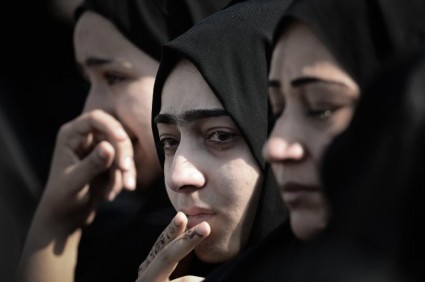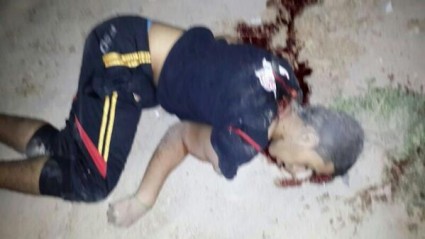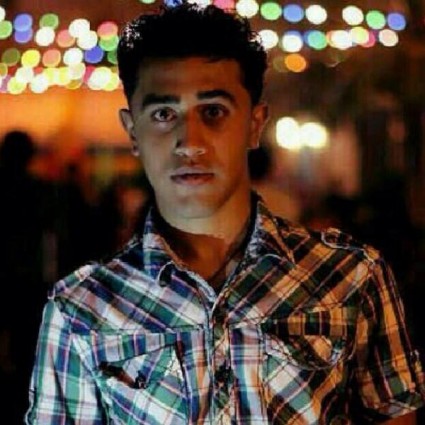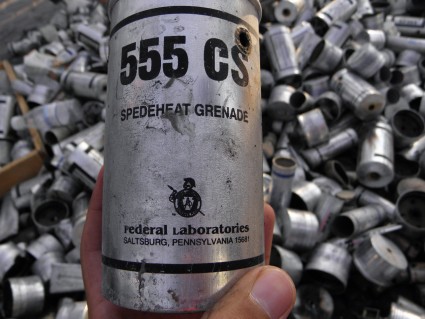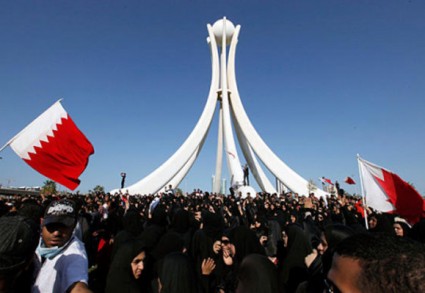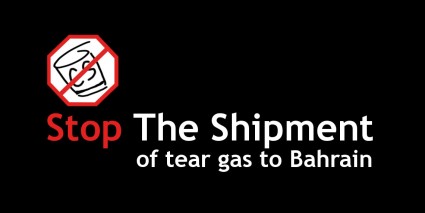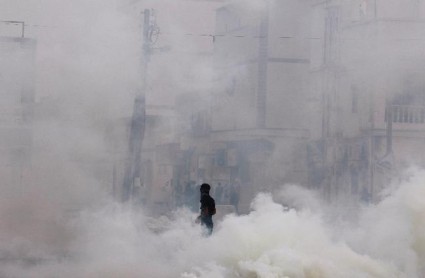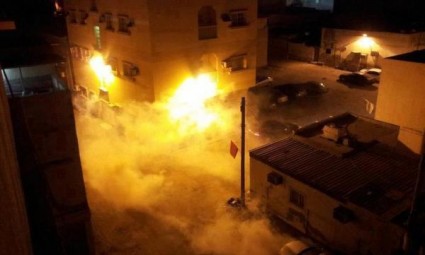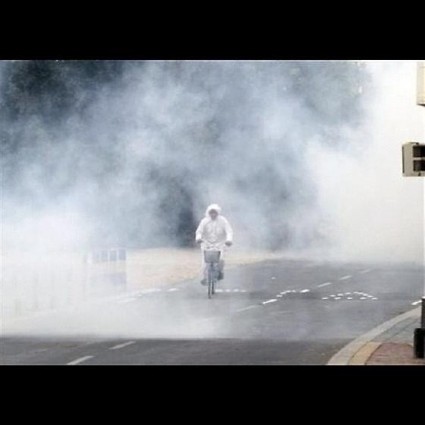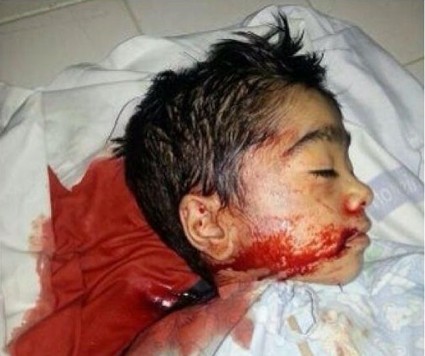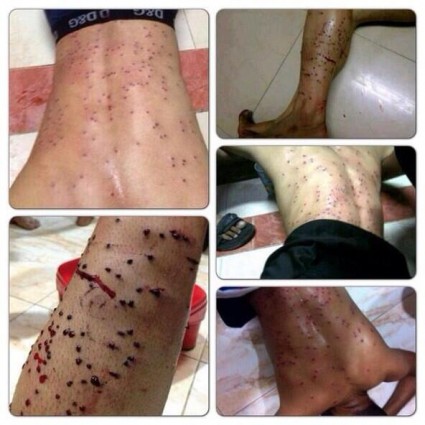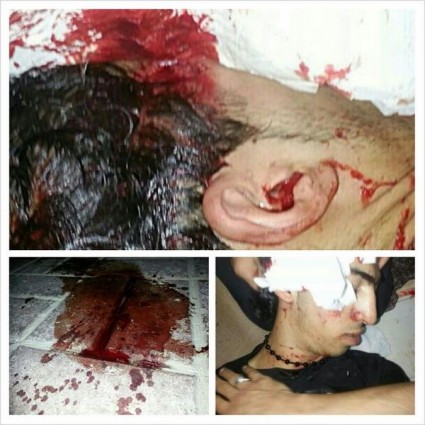Belligerent Saudi Regime kicking their American “Friends” and “Partners” to the Curb?
Saudi-US Row: Prince Bandar bin ‘Sulking’ Tries Old Bribe and Threat Trick Again
Finian Cunningham – 24 October, 2013 – Strategic Culture
Historic allies, the United States and Saudi Arabia, are in the midst of a full-blown row, after the kingdom’s spy chief Prince Bandar bin Sultan threatened that their strategic liaison was on the rocks.
The sulking sultan is no stranger to maverick mood swings. But there is good reason to believe that the senior Saudi is not merely acting alone, and that this is the obscurantist kingdom’s way of expressing strategic frustrations…
Rumbling tensions over various geopolitical issues have now erupted into full public glare when Prince Bandar briefed invited unnamed Western diplomats to his majlis at the Red Sea city of Jeddah last weekend. The purpose was for the Saudi royal to vent his anger over recent «disappointments» caused by Washington’s policies in the Middle East.
«This message is for the US», said Bandar, who was formerly Saudi ambassador in Washington.
According to the Wall Street Journal, the Saudi intelligence chief told diplomats that the kingdom was now seeking other strategic allies, without specifying just who these new partners might be. Whether a full break with Washington will come to pass is moot, but the fact that the more than eight decades of staunch alliance between the US and Saudi Arabia is being dangled in the wind shows that there are deep misgivings and high stakes over recent geopolitical developments.
Arm-twisting tactics by Prince Bandar are nothing new. Earlier this summer the Saudi spymaster tried to cajole Russian President Vladimir Putin to ditch Moscow’s historic alliance with Syria. Bandar, who is also known as «Bandar Bush» owing to close ties to the Washington establishment, attempted to inveigle Putin then with a mixture of bribes and threats.
During the private meeting with the Russian leader Bandar reportedly offered Russia lucrative oil and gas contracts in the Middle East and hinted that he could ensure security for the forthcoming Sochi Winter Olympic Games by exerting his influence on Al-Qaeda-linked terror groups. To his credit, the Russian president gave his Saudi guest short shrift over the unseemly proposal.
The recent weekend confab in Jeddah between Prince Bandar and Western diplomats followed the extraordinary move by Saudi Arabia to reject a non-permanent seat on the UN Security Council. That seat had been much coveted by the Saudis and had been offered after lobbying from Washington. The Saudi snap rejection was therefore a calculated snub to Washington.
Officially, the Saudis endeavored to cloak that decision with high-minded principle, claiming that it was a protest over the Security Council’s inability to defend the rights of Palestinians, create a Middle East free of weapons of mass destruction, and failure to sanction the «Damascus regime» of Bashar al-Assad in Syria.
Nobody is buying that self-righteous, stilted rhetoric. Saudi Arabia has shown little interest in defending the historic rights of the Palestinians under relentless Israeli expansionism, and the kingdom is one of the main purveyors of (non-nuclear) weapons of mass destruction in the Mid-East, if not the entire world.
The real reason for the Saudi chagrin with its American patron is the latter’s failure to launch an all-out military assault on Syria last month, when Russian diplomacy secured a chemical weapons decommissioning deal to avert American aggression. The other major related factor for the Saudi spat with Washington is the latter’s new diplomatic overture to Iran in their ongoing nuclear dispute. …more
October 24, 2013 Add Comments
Bahrain Regime moves to silence remaining Oppostion Leadership not yet Imprisoned
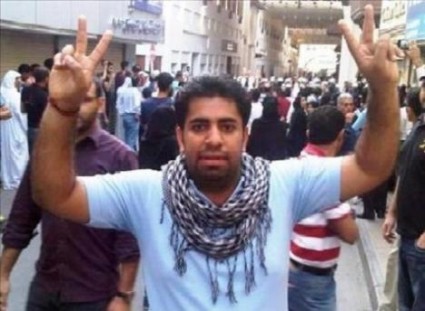
Mohammed Al-Maskati Supporting Pro-democracy
Bahrain: Ongoing campaign against human rights defender, Mohammed Al-Maskati, following visit to United Nations in Geneva
23 October, 2013 – frontline Defenders
On 22 October 2013, Mohammed Al-Maskati was summoned to Al Khamis Police Station for interrogation, which he attended with his lawyer on the morning of 23 October 2013. The Ministry of Interior has accused the human rights defender of “inciting hatred against the regime”. Mohammed Al-Maskati was released from interrogation today after he signed a declaration stating that he will present himself before the public prosecutor at any time. This pressure tactic effectively curtails Mohammed Al-Maskati’s fundamental rights and places him in a vulnerable position while carrying out his human rights activities.
Mohammed Al-Maskati is the founder and current President of the Bahrain Youth Society for Human Rights (BYSHR), an organisation which monitors and documents human rights violations, organises training workshops, and supports regional networking for human rights defenders.
The recent interrogation of Mohammed Al-Maskati related to a speech he made on 8 September 2013 in Jidhafs Town in which he discussed human rights as outlined in international legal mechanisms. In August 2013, Mohammed Al-Maskati visited the Special Rapporteurs affiliated with the UN Office of the High Commissioner for Human Rights and met diplomatic missions in Geneva in coordination with several regional and International Human Rights organisations.
In 2012, Mohammed Al-Maskati also faced repercussions as a result of attending the Human Rights Council (HRC) in Geneva. On 16 October 2012, a few weeks after attending a HRC panel, Al-Masktai was summoned for interrogation at Al-Hoora police station and detained overnight. He was brought before the Public Prosecution office on charges of “rioting and participating in an illegal gathering.” On 17 October 2012, he was released with charges pending. At that time, he also received death threats for supposedly tarnishing “the image of Bahrain in Geneva”, and was the target of a media smear campaign.
The intimidation against Mohammed Al-Maskati relates also to his activities locally. On 19 June 2013, Mohammed Al-Maskati appeared before the Lower Criminal Court on charges of “participation in illegal protests” in relation to his participation in a peaceful demonstration in Manama on 12 October 2012. Further, On 27 November 2007, Mohammed Al-Maskati was summoned to the Fourth Minor Criminal Court on charges of “activating [an] unregistered association before issuing the declaration of registration”.
Front Line Defenders expresses concern at the measures taken by the Bahraini authorities to restrict the practice of Mohammed Al-Maskati’s human rights and fundamental freedoms, and believes these measures to be a result of his legitimate engagement with these international instruments. The Bahraini government was a member of the HRC from 2008 – 2011, and should therefore facilitate the engagement of local human rights defenders rather than curtail their representation or sanction them for their peaceful advocacy. …source
October 23, 2013 Add Comments
Demonstrations Breakout on Word of Police Killing of 17 year old Ali Khalil AlSabag
October 22, 2013 Add Comments
In Bahrain, “lives cheaper than car tires”
Leading activist: Bahraini lives “cheaper than car tires”
21 October, 2013 – Al Akhbar
An appellate court on Monday reduced to three years the prison sentence of a police officer convicted of killing the first martyr of Bahrain’s 2011 anti-government uprising, as three activists were handed five-year jail terms for burning tires at an “illegal gathering,” judicial sources and a human rights group said.
A Bahraini court originally sentenced the unnamed police officer in January to seven years in jail for fatally shooting 21-year-old Ali Musheime in the back on February 14, 2011 in the village of al-Daih during a “day of rage” rally which ignited a massive, pro-democracy rebellion against the Gulf island’s western-backed ruling family.
A second youth was killed the following day when police opened fire on Musheime’s funeral procession. Amnesty International said that “clear evidence” was present of “police brutality and excessive force” in those killings.
At least 87 more would be killed in the ensuing crackdown on dissidents, according to the Bahrain Center for Human Rights (BCHR).
The appellate court decided to reduce the policeman’s sentence after three fellow officers who witnessed Musheime’s killing claimed their colleague acted in “self-defense,” lawyers said.
The ruling comes as members of BCHR reported over Twitter that a separate court on Monday sentenced three protesters each to five years in prison for burning tires and taking part in an “illegal gathering.”
“Human lives in Bahrain [are] cheaper than car tires,” Maryam al-Khawaja, BCHR’s acting director, wrote on Twitter. …more
October 22, 2013 Add Comments
Another Bahrain Police Murder – 17 Year Old, Ali Khalil AlSabag, with shot to head
17 Year Old, Ali Khalil AlSabag has been killed in more senseless Police Violence against Bahraini Citizens. As young Ali’s father went to see his son’s body, police have brutally beat and detained him. Outraged Citizens are marching in throughout Bahrain. 22 October, 2013
October 22, 2013 Add Comments
Tear-gas shells replace the Pearl as the symbol of Bahrain
Tear-gas shells replace the Pearl as the symbol of Bahrain
Patrick Cockburn – 20 October, 2013 – PressTV
Two-and-a-half years ago the Bahrain government bulldozed the Pearl Monument, whose tall, graceful pillars held a giant pearl as a symbol of the island kingdom, because it had become the rallying point in the capital, Manama, for pro-democracy protesters. The authorities have never chosen a new symbol to replace the one they destroyed, but, if they do so, they might well like to consider the tear-gas shell or canister as best symbolising Bahrain as it is today. In keeping with this, the government has reportedly signed contracts with South Korean, German and South African firms for 1.6 million tear-gas shells of different calibres, giving it more than one projectile for every Bahraini citizen.
On every side there are signs of increased repression by the Sunni al-Khalifa royal family, which monopolises power in a country where Shia make up 60 per cent of the population. Between 2,400 and 3,000 people are in jail. In recent weeks, 50 Shia, including human-rights activists, were given up to 15 years in prison after the briefest of trials. Yousif al-Nashmi, allegedly tortured when detained by police, died in hospital soon after his release. The public prosecutor’s office said “the deceased was admitted to hospital on September 23 in a critical condition and was diagnosed with Aids”.
Two points have become clear during the 30 months since mass protests began on 14 February 2011: The protesters have not been cowed by persecution and the government has responded by turning Bahrain into a repressive police state. After tentative and unfulfilled promises of dialogue and reconciliation at the end of 2011, the monarchy reverted to reliance on force to crush the opposition. Significantly, the UN Special Rapporteur on Torture, Juan Mendez, has been twice denied entrance to Bahrain, most recently in April. A critic of the regime living in Bahrain, who did not want his name published, said that “over the last year torture has once again become the norm for anybody detained”.
Sensitivity to the degree to which Bahrain has apparently turned into an island of hate, with chasm-like divisions between rulers and ruled and between Sunni and Shia, was illustrated by the over-heated official reaction to President Obama’s reference to Bahrain in his speech to the UN General Assembly on 24 September. He had spoken mildly of “sectarian tensions that continue to surface in places like Iraq, Bahrain and Syria”, but Bahraini ministers queued up to deny that Bahrain had anything in common with Syria and Iraq. Interior Minister Sheikh Rashid bin Abdallah al-Khalifa, whose ministry is said to be importing industrial quantities of tear gas, said Bahrain had “never witnessed at any time sectarian tensions”. The Foreign Minister, Sheikh Khaled bin Ahmed al-Khalifa, claimed that the kingdom had fostered a culture of tolerance between different communities. He added that “what is occurring in Bahrain… is a concerted effort by terrorist extremist groups to target security personnel and expatriates with the intent of spreading fear and division”.
As with many authoritarian regimes over the centuries, the Bahraini government might find it difficult to ease repression even if it wanted to. The fears of the Bahraini Sunni community have been stoked by claims of the existence of terrorist plots inspired by Iran in support of its fellow Shia. But an independent inquiry led by the US-Egyptian legal authority, Cherif Bassiouni, on how Bahrain handled the unrest in 2011, found no evidence of Iranian involvement. Allegations of revolutionary intentions become self-fulfilling: Moderate bloggers and civil-rights activists who have been mistreated and given long sentences tend to be less moderate when they get out of jail.
Why have the al-Khalifas stepped up their efforts to crush the opposition over the summer? One reason is probably sheer frustration that 30 months after the first demonstrations at the Pearl Roundabout, protesters in Shia villages still confront police and hold marches. There is also an exaggerated perception in Bahrain – as in Saudi Arabia and in the other Gulf monarchies – that American power in the Middle East has declined more sharply than in fact it has. Thus the authorities felt free to arrest a prominent opposition leader, Khalil al-Marzouq, the Assistant Secretary General of al-Wefaq, the main opposition party, on 17 September. The opposition had hoped their leaders might enjoy limited protection because their detention would annoy Washington and Western Europe.
October 22, 2013 Add Comments
South Korea Embassy in London See Protests Against CS Gas to Bahrain
South Korea rapped for selling arms to Bahrain
19 October, 2013 – PressTV
Protesters outside the South Korean Embassy in London have called on Seoul to stop shipments of tear gas to Bahrain.
The demonstration by the Campaign Against Arms Trade (CAAT) and free Bahrainis was held at South Korea’s diplomatic mission in the British capital on Friday, October 18.
Protesters carrying Bahraini flags and photograph of tear gas injuries, condemned South Korea’s export of riot control equipment to Bahrain’s Al Khalifa regime while it faces accusations of human rights violations.
Some demonstrators were wearing gas masks and others held tear gas canisters. They were also carrying banners reading, “Tear gas kills” and “Stop the shipment.”
Earlier this week, Bahrain Watch, an independent human rights group, published a document dating back to July and allegedly showing Bahrain’s Interior Ministry plans to import 1.6 million tear gas canisters and some 90,000 tear gas grenades.
“I think if you look at the scale and frequency of the use of tear gas in Bahrain, it’s unprecedented anywhere in the world,” said Alaa Shehabi, a founding member of Bahrain Watch.
Since mid-February 2011, thousands of pro-democracy protesters have staged numerous demonstrations in the streets of Bahrain, calling for the Al Khalifa family to relinquish power. The protests have been met with a heavy-handed crackdown.
Physicians for Human Rights say doctors and nurses have been detained, tortured, or disappeared because they have “evidence of atrocities committed by the authorities, security forces, and riot police” in the crackdown on anti-government protesters. …source
October 22, 2013 Add Comments
Iran has Economic leverage to Demand Stop S. Korea from Exporting CS Gas to Bahrain
South Korea’s Sep Iranian crude imports double from Aug to 137,467 b/d
Platts – 22 October, 2013
South Korea’s imports of Iranian crude oil in September more than doubled from the previous month to 4.12 million barrels, or 137,467 b/d, compared with 1.97 million barrels in August, data released by state-owned Korea National Oil Corp. showed Tuesday.
The country had no crude imports from Iran in August and September last year in line with US-led sanctions on Iran.
“Crude imports from Iran increased in September compared with the previous month, but total volume imported for the first nine months was down on a yearly basis,” a KNOC official said.
From January to September, South Korea imported 37.28 million barrels of crude from Iran, down 3.8% from 38.77 million barrels in the same period last year.
South Korea was granted a 180-day exemption from US financial sanctions since last year allowing it to keep buying Iranian crude oil as long as it showed an effort to reduce reliance on the supplies.
The country imported 56.15 million barrels of Iranian crude in 2012, down 35.6% from 87.18 million barrels in 2011.
South Korea’s total crude oil imports in September fell 6.4% year on year to 74.75 million barrels, or 2.49 million b/d, compared with 79.85 million barrels in the same month last year.
Meanwhile, South Korea’s oil consumption slipped 4% year on year to 64.59 million barrels, or 2.15 million b/d, in September, from 67.30 million barrels a year earlier.
Oil demand in September was down 7.3% from 69.70 million in August. The country’s refined product exports in September plunged 20.6% year on year to 35.66 million barrels, equivalent to 1.19 million b/d, from 44.93 million barrels a year earlier.
The September exports represented a fall of 3.4% from 36.94 million barrels in August.
South Korea imported 24.71 million barrels of oil products, or 823,667 b/d, in September, down 17.5% from 29.95 million barrels in the same month last year.
September imports were 4% lower from the 25.73 million barrels in August. …source
October 22, 2013 Add Comments
Bahrain imports chemical and tear gases twice the population
Bahrain: Imported chemical and tear gases twice the population
By davidswanson – 18 October, 2013 – warisacrime.org
Bahrain’s Ministry of Interior is planning to import 1.6 million tear gas canisters and 90,000 tear gas grenades, according to a leaked document, published Wednesday 17th October by research and advocacy group Bahrain Watch. The document — apparently a tender issued by the Ministry of Interior’s Purchasing Directorate — shows that Bahrain’s security forces are stockpiling massive amounts of tear gas, despite serious concerns of international NGOs and the United Nations Human Rights Council. These groups have called Bahrain’s use of tear gas “unnecessary and indiscriminate”, and “lethal”. This planned new shipment will supply Bahrain with more tear gas canisters than the entire population of the country. Efforts are underway to challenge this massive deal which has confirmed what the opposition had claimed; the Alkalifa are there to kill, maim and torture as many Bahrainis as possible.
The ferocity of repression was laid bare in recent days. Yesterday regime’s security forces attacked peaceful protests in many areas causing serious injuries. The intensification of repressive attacks by those forces are desperate measures to stem the deepening political and humanitarian crisis engulfing the country. At the end of the three-days mourning of last weeks’ martyr, Yousuf Al Nashmi, 31, at Al Musalla Town, the funeral service was attacked by regime’s forces using chemical and tear gases and shotguns against participants. A young man from Karzakkan Town received a direct hit fired by the police using shotguns. He has been admitted to intensive care as his condition remains critical. He suffers broken skull and severe internal bleeding.
Many Bahraini youth have been detained in the past week. Among them is Mohammad Al Nashaba, 21 who was snatched from his house in the early hours of the Eid Day, Tuesday 15th October. Another youth, Jaffar Al Wada’ei, 19, was also snatched from his home and taken to Alkhalifa torture dungeons.
On 14th October, Foreign Policy website has published an article titled “Ignoring Bahrain’s iron fist”. It was written by Sarah Margon, acting Washington director at Human Rights Watch and Mary Laurie, a fellow in the Human Rights Watch Washington office. It said: “For two years, as the United States has condemned massive abuses of protesters throughout the Middle East, it has largely turned a blind eye to equally horrific treatment in Bahrain, a small but significant ally. As the situation in Manama shows no sign of abating, the United States needs to step up its game — before it’s too late.” After detailing America’s stands on Bahrain in the past two years including what President Obama said in his address at the UN recently, it concluded: “If the United States is trying to gain leverage with Bahrain’s rulers by limiting its criticism, there is no evidence that this app roach is making a difference. In fact, it appears to be making a bad situation worse.”
Although the regime’s forces are committing atrocious crimes against Bahrainis every day, only a portion of those crimes are documented. The link below shows how those forces are waging war against Bahraini natives. The crime which has been recorded took place at Al Ekr Town. Those forces prefer to commit their crimes on the secluded roofs of houses they raid without legal permission. A similar video was broadcast about a similar crime at Alaker Town last year.
Meanwhile, the protests have continued in most parts of the country under different mottos. The regime’s failure to contain the situation or defeat the Revolution has taken the struggle steps ahead and created more pressure on Alkhalifa’s allies especially Washington. The protest on Tuesday to mark the end of the commemoration service of Martyr Yousuf Al Nashmi, has proven beyond doubt that the people are clear in their minds about what they want, and possess power and carriage to counter the regime’s mouthpieces. …source
October 22, 2013 Add Comments
STOP THE SHIPMENT – NO MORE CS GAS TO BAHRAIN
Bahrain’s Ministry of Interior is planning to import 1.6 million tear gas canisters and 90,000 tear gas grenades, according to a leaked document, published today by research and advocacy group Bahrain Watch. The document — apparently a tender issued by the Ministry of Interior’s Purchasing Directorate — shows that Bahrain’s security forces are stockpiling massive amounts of tear gas, despite serious concerns of international NGOs and the United Nations Human Rights Council. These groups have called Bahrain’s use of tear gas “unnecessary and indiscriminate”, and “lethal”. This planned new shipment will supply Bahrain with more tear gas canisters than the entire population of the country. …more
October 22, 2013 Add Comments
Stop the Killing and Abuse with CS Gas by US “friends and partners” in Bahrain
Activists urge Korea to cancel massive tear gas shipment to Bahrain
18 October, 2013 – Al Akhbar
Rights activists have launched a campaign urging South Korea to cancel an imminent shipment of over 1.6 million tear gas canisters allegedly ordered by Bahraini authorities battling a two-and-a-half-year-long rebellion.
An unverified document dated June 16, 2013 obtained this week by the monitoring group Bahrain Watch shows that Bahrain’s Ministry of Interior has requested an order of 1.6 million tear gas shells, 145,000 stun and flash grenades, and 90,000 tear gas grenades.
The massive figure startled observers who pointed out that the quantity was larger than the entire 1.2 million population of Bahrain, half of which is comprised of foreigners and migrant workers not involved in the largely-peaceful, anti-government movement.
“I think if you look at the scale and frequency of the use of tear gas in Bahrain, it’s unprecedented anywhere in the world,” Alaa Shehabi, a founding member of Bahrain Watch which is behind the Stop the Shipment campaign, told Al-Akhbar.
“They (police) are using hundreds of rounds on a nightly basis, … so they need this amount to sustain the constant state of repression.”
Shehabi added that her group has received information that the order is expected to be delivered before the end of this month.
“We’ve had, in the last 24 hours since we launched the campaign, 11,000 e-mails sent to Korean agencies involved in shipment,” Shehabi said.
Heeding activists’ calls, the Korean Confederation of Trade Unions have condemned the tear gas deal and urged authorities to prevent the shipment, citing humanitarian concerns.
The procurement tender does not specify the supplier of the weapons, but activists say that the bulk of the tear gas that reaches the tiny Gulf island is manufactured by two South Korean companies and a joint German-South African one.
Rheinmetall Denel Munition, the German-South African company, and South Korea’s Defense Acquisition Program Administration both declined to comment on the alleged deal.
Police have killed at least 89 people since the anti-government uprising erupted in February 2011, according to the Bahrain Center for Human Rights. Of those victims, 39 died from tear-gas related attacks including suffocation and direct shots to the head, records from Physicians for Human Rights show.
Authorities have so far been unable to quell the nearly daily demonstrations that persist across Bahraini villages against the widely-detested, US-backed monarchy. Dozens of human rights activists, doctors and political opponents have been jailed since the start of the uprising.
Over the past month alone, Bahrain sentenced 104 protest leaders to prison terms of up to 15 years on “terrorism” related charges. …source
October 22, 2013 Add Comments
Bahrain’s Widespread Abuse includes use of Birdshot Against Village Protesters
October 22, 2013 Add Comments
Night raids, torture, rampant gassing, sham trials a daily reality in Bahrain
October 22, 2013 Add Comments
Clouds of Death – Story of Chemical Gassing and Collective Punishment in Bahrain
THE UNITED STATES ONGOING SUPPORT FOR THE BLOODY BAHRAIN REGIME AND FAILURE TO ACT AGAINST ITS ONGOING SYSTEMATIC HUMAN RIGHTS ABUSE IS NOT ONLY SHAMEFUL HYPOCRISY, IT IS CRIMINAL CONSPIRACY.
March, 2013
Recent events in Bahrain reveal an abuse of CS Gas being used at levels beyond any rational means of crowd or riot control”. The Regime’s deliberate, lethal misuse and abuse of CS GAS is Criminal and Genocidal toward the Majority Shia Population in Bahrain. The Bahrain MOI is responsible for directing the abuse of CS Gas at levels designed to inflict death and long term injury to the individual and genetic health of innocent people who inhabit Bahrain’s Villages. Meanwhile the United States’ and United Kingdom’s only Action Against their Brutal ALLY is an occasional, vain utterance about Regime Abuses. Today they again stand silent while their Ally, South Korea exports more CS Gas canister to Bahrain than there are Citizens to Poison.
MR. CAMERON AND MR. OBAMA, WE HAVE GROWN TIED OF YOUR LIES AND SUPPORT FOR THE AL KHALIFA REGIME IN BAHRAIN. YOUR CONTINUED SILENCE AND YOUR FAILURE TO ACT WITH GENUINE MEASURE TO STOP THE HUMAN CRUELTY FROM THE AL KHALIFA REGIME IS COMPLICITY.
October 22, 2013 Add Comments
Bahrain Regime Desperately needs a new Approach to “Reform Dialogue”
October 22, 2013 Add Comments
On the Occasion of the Assassination of 20 Year Old, Hussein Mahdi Habib
Opposition Activist Martyred by Regime Forces in Bahrain
20 October, 2013 – Al Manar
The regime forces in Bahrain killed a new opposition activist as he was demanding freedom and political as well as social reform.
Hussein Mahdi Habib, 20, hails from Sitra Island, northeastern Bahrain.
Habib, who had been already sentenced in absentia to 15 years, was shot dead by the regime forces.
People have taken to the streets in the Bahrain’s northeastern island to stage a demonstration against the al-Khalifa regime.
The protesters shouted anti-regime slogans and called for the freedom of political prisoners in the tiny Gulf country.Sheikh Salman
The Secretary General of the Bahraini prominent opposition group, al-Wefaq, Sheikh Salman, slammed the regime for its consistence rejection to start a serious national dialogue.
“Manama authorities believe in stifling the Bahrainis.”
Sheikh Salman also called on wide participation in the humanitarian campaign to prevent importing the tear gas bombs from North Korea.
Arab and Western newspapers mentioned that Bahrain marks the highest international rates of using such bombs against the Bahrainis who seek democracy and freedom in their country. …source
October 22, 2013 Add Comments
The Unabated, Dispicable System of Human Rigths Abuse in Saudi Arabia
Saudi Arabia- International spotlight shows broken human rights promises as oppression and violations continue
22 October, 2013 – Gulf Center for Human Rights
Saudi Arabia has failed to deliver on promises it made to the international community. In 2009 Saudi Arabia pledged to implement recommendations made at its Universal Periodic Review (UPR) in relation to its human rights record. At its second UPR, which took place in Geneva on 21 October 2013, Saudi Arabia failed to show that it had implemented or taken steps to implement the recommendations. On the contrary a crackdown continues across the country against those demanding that their human rights be respected.
Citizens continue to be deprived of their basic human rights and human rights defenders and their families continue to be targeted as a result of their human rights work. Many face a myriad of violations including arbitrary arrest and detention, torture, travel bans, judicial harassment and unfair trials. Alleged counter-terrorism measures are being increasingly used as a tool to arrest human rights defenders. Furthermore, civil society has been faced with a renewed crackdown over the past two years and impunity for human rights violations is increasing. For further information see Gulf Centre for Human Rights (GCHR) appeals on Saudi Arabia. (http://gc4hr.org/news/index/country/3)
Women continue to be discriminated against in Saudi Arabia. The GCHR issued an appeal on 17 October 2013, as authorities are targeting those campaigning for the right of women to drive. The GCHR fully supports the “26 October Campaign”, which designates the 26 October as a day for women to drive. (http://gc4hr.org/news/view/504)
Failure to implement the UPR recommendations marks a pattern of behaviour by Saudi Arabia, which has shown a persistent lack of cooperation and respect for UN mechanisms. On 18 October 2013 it declined a non-permanent seat on the UN Security Council on the basis that the body had failed in its duties to act in conflicts including that taking place in Syria. This move has been viewed as ironic by human rights organisations. Furthermore Saudi Arabia has yet to sign and ratify core UN human rights treaties and agreements such as the International Covenant on Civil and Political Rights, the International Covenant on Economic, Social, and Cultural Rights, the International Convention on the Elimination of All Forms of Racial Discrimination, and the Convention on the Protection of the Rights of All Migrant Workers and Members of Their Families. It has also refused to allow visits by seven UN Special Rapporteurs since 2009.
In 2013, many prominent human rights defenders have been convicted on broad charges following unfair trials. In March, two founders of the prominent Saudi Civil and Political Rights Organisation (ACPRA), Abdullah Al-Hamid and Mohammed Al-Qahtani, were sentenced to 10 and 11 years respectively due to posts they made on Twitter promoting human rights and the organisation was dissolved. They were found guilty of “breaking allegiance and disobeying the ruler”, “undermining unity”, “questioning the integrity of officials”, “seeking to disrupt security” and “inciting disorder by calling for demonstrations”. Others convicted on such broad charges this year include Mikhlif Al-Shammari, Wajeha Al-Huwaider, Fouzia Al-Oyuni, Raef Badawi, Mohammed Al -Bajady and Sulaiman Al-Rashudi. Saudi courts are currently trying others, including the human rights lawyer Waleed Abu al-Khair, on similar charges while others continue to face harassment and travel bans. …more
October 22, 2013 Add Comments
Weaponizing Tear Gas: Bahrain’s Unprecedented Use of Toxic Chemical Agents Against Civilians
October 18, 2013 Add Comments
US Citizens Must be Brought to Realize Obama is Enabling Brutal Tyranny
October 18, 2013 Add Comments
South Korea Reckless Arms Sales to Brutal Dictator in Bahrain, Kills and Injures Citizens
October 18, 2013 Add Comments
Bahrain Political Prisoner’s Message Moves Beyond Confines of Prison Walls
Messages from imprisoned and targeted human rights defenders in Bahrain
كتب : Mohamed Wadie – 17 October, 2013
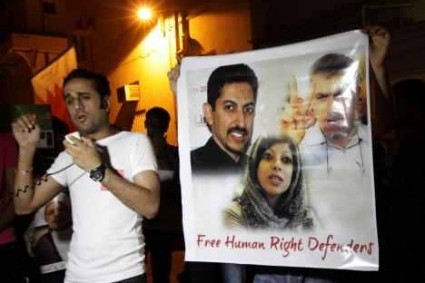
In this photo taken on 12 August 2012, activist Said Yousif al-Muhafdah speaks to protesters in Bahrain, calling for freedom for jailed rights activists seen on the poster at right, Abdul Hadi al-Khawaja, Nabeel Rajab and Zainab al-Khawaja
Acting Vice President of the Bahrain Center for Human Rights Said Yousif AlMuhafdah spoke at the 7th Frontline Defenders Platform for Human Rights Defenders at Risk on 11 October 2013. This is a transcript of his speech:
My name is Said Yousif AlMuhafdah – Acting Vice President of the Bahrain Center for Human Rights, and a human rights defender from Bahrain. I got arrested several times for doing my work and for cooperating and reporting to the United Nations. Like other defenders in Bahrain, I have been beaten, defamed, threatened and harassed because of my work in human rights. Two days ago, after arriving in Dublin, my family informed me that I have received a summons for interrogation because I spoke about torture.
Human rights defender Naji Fateel, who had previously delivered a speech at Frontline, is now sentenced to 15 years in prison and was subjected to severe torture because of his work in the field of human rights.
Abduljalil AlSingace, another human rights defender, suffers from paralysis, but that did not stop the regime from severely torturing him and sentencing him to life imprisonment.
Today I would like to share with you letters from two imprisoned human rights defenders in Bahrain directed to the Special Rapporteur for Freedom of Expression and Assembly, Frontline, other international organizations and all international human rights defenders.
The first letter is from imprisoned rights defender Nabeel Rajab, head of the Bahrain Center for Human Rights:
“Dear friends, colleagues and fellow human rights defenders at the 7th Frontline Defenders Platform for Human Rights Defenders,
I am addressing you from a cell in Bahrain, where I have been imprisoned since July 9th, 2012. The Bahraini regime decided to silence my voice from defending freedom of speech and from defending the rights of all Bahrainis for freedom, democracy and social justice. I ask you, my friends and colleagues, to help the long-suffering people of Bahrain to regain their rights from a tyrant regime. There was international condemnation of the widespread human rights violations which included extrajudicial killings, systematic torture, arbitrary arrests and the list is long; but the regime refuses to change.
Several human rights defenders, including myself, were put in prison just for speaking out. I ask you to stand in solidarity with the imprisoned human rights defenders in Bahrain.
Thank you so much for listening to the voice of Bahrainis and I look forward to your kind and heartfelt actions.”
The second letter I will share with you today is from imprisoned human rights defender Zainab Alkhawaja, whose father, Abdulhadi Alkhawaja worked at Frontline before he was imprisoned, tortured and sentenced to life in prison in Bahrain:
“In a nutshell, the idea is that by defending human rights activists you’re also defending their communities. Defend one activist and you’ll be protecting tens or even hundreds of other people. A few years back, my father described to me what Frontline does, and I could see the passion that he has for his work
But it’s more than just work for him, defending others is not what my father does, it’s who my father is.
Never was this more clear to me than when my father told me about his experience in military prison.
He calmly told me about two months in isolation, about not being allowed to speak, about never seeing a human face. He described the torture sessions and the masked torturers.
But the calm disappeared, and I saw pain in my father’s eyes when he told me: “The worst thing was never when I was being tortured. The worst thing was when I could hear the others being tortured and I couldn’t do anything.”
He tried. My father’s first hunger strike during this imprisonment was while he was in solitary confinement and being tortured routinely. His only demand was that they stop torturing the head of the teachers’ union Mahdi abu Dheeb in the cell next to him, and whose screams he could hear.
My father was tortured severely until he ended that strike.
My father and other defenders have dedicated their lives to defending victims, educating people about their rights, and exposing the regime’s crimes.
The regime in Bahrain fears international pressure more than they care about people’s rights. Their solution is to commit their crimes in darkness, far away from the eyes of the international community, the media, and human rights organizations.
The best way to achieve this is by silencing those who shed light on the human rights abuses being committed against the people of Bahrain.
In a nutshell, the Bahraini regime has realized that by arresting and silencing one human rights activist, you can more easily oppress tens and hundreds of other people.
The Bahraini regime is therefore shamelessly targeting human rights activists through arrests and torture, detention and beatings, threats and interrogations, and defamation campaigns. And as more activists are silenced simultaneously we see a rise in the human rights abuses, violations, and crimes towards the general Bahraini population.
…source
October 18, 2013 Add Comments
Al Khalifa Bloody, Sectarian Brutality, widens chasm, builds resolve of Revolution
Bahrainis determined to get political change: Saeed Shehabi
16 October, 2013 – PressTV
October 18, 2013 Add Comments
Western Neoliberal Reductionism tries to Rationalise “Arab Spring” – Cost, Benefits? Really?
Costs of Arab Spring Outweigh Benefits, Says Bank
18 October, 2013 – Robert Joyce – tunisialive
The economic costs of the Arab uprisings may outweigh their benefits to countries like Tunisia, according a recently-released report from a major bank.
Collectively, the political upheaval in the Arab world that began in 2011 will have cost Tunisia, Egypt, Bahrain, Syria, Libya, Jordan, and Lebanon $800 billion between 2011-14, according to international bank HSBC.
The report, titled “A Bitter Legacy,” calculates the costs of the wave of uprisings which started in Tunisia in 2010.
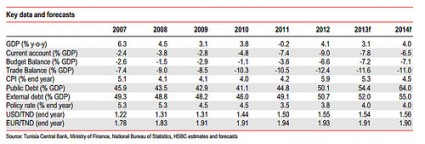
GDP statistics for Tunisia from HSBC’s report October 2013
Using seven countries that the researchers, Elizabeth Martins and Simon Williams, argue were most affected by the upheaval, the report compares pre-2011 growth forecasts with post-2011 realities and predictions to put a dollar amount on what has been called the Arab Spring.
The report has a negative tone, suggesting that the economic costs of the post-2011 situation outweigh any positive gains in the region.
“Any gains also pale when set against the economic losses much of the region has suffered since the start of what is still called the Arab Spring,” the report, produced for the bank’s clients, states.
Dueling protests and ongoing talks have avoided the sort of violence seen in Egypt, but have made Tunisia appear unstable to investors and prevented post-revolution economic recovery from gaining momentum.
Gross domestic product growth has been unsteady since taking a dramatic hit during the 2011 revolution. Unemployment, a major complaint of Tunisians, has also increased.
Security failures, including the assassination of opposition politician Mohamed Brahmi and the attacks on military forces, exacerbate these concerns.
The report states that there is a low likelihood a coup will take place in Tunisia, but actually views this as weakening investor confidence in the country.
“In contrast to Egypt, the military and security services are less powerful and deep rooted, leaving no ready-made alternative to the post-revolutionary structures,” the report states.
…more
October 18, 2013 Add Comments
US Moves to Change World into Open Arms Bazaar
October 18, 2013 Add Comments
Obama’s Appalling Policy of Passive Support for Human Rights Abuse in Bahrain
Appalling Human Rights Abuses in Bahrain
17 October, 2013 – By Stephen Lendman – Media with Conscience
Rights Abuses in BahrainSince February 2011, Bahrainis challenged state terror policies heroically. Brutal crackdowns followed. They continue.
They include mass arrests, imprisonments, torture, kangaroo court trials, and overall ruthlessness.
Bahrain’s ruling Al Khalifa monarchy is a close US ally. Washington provides material support. It’s one of the world’s most despotic regimes. Ruthlessness defines its policies.
According to the State Department’s 2012 human rights report, serious human rights abuses persist.
They include “citizens inability to change their government peacefully; arrest and detention of protesters on vague charges, in some cases leading to their torture in detention; and lack of due process in trials of political and human rights activists, medical personnel, teachers, and students, with some resulting in harsh sentences.”
“Other significant human rights problems included arbitrary deprivation of life; arrest of individuals on charges relating to freedom of expression; reported violations of privacy; and restrictions on civil liberties, including freedom of speech, press, assembly, association, and some religious practices.”
“The government sometimes imposed and enforced travel bans on political activists.”
“Discrimination on the basis of gender, religion, nationality, and sect persisted, especially against the Shia population.”
“There were reports of domestic violence against women and children.”
“Trafficking in persons and restrictions on the rights of foreign workers continued to be significant problems.”
In more detail, the State Department cited:
– “Arbitrary or Unlawful Deprivation of Life;”
– “Disappearance(s)”
– “Torture and Other Cruel, Inhumane, or Degrading Treatment or Punishment;”
– Horrific prison and detention center conditions;
– “Arbitrary Arrest(s) (and) Detention(s);”
– Lawless arrest procedures and treatment;
– “Denial of Fair Public Trial(s);”
– Imprisonment for political reasons;
– Lawless civil judicial procedures and remedies;
– “Arbitrary Interference with Privacy, Family, Home, or Correspondence;”
– Speech, press and other civil liberties violations;
– Restricted Internet freedom;
– Restricted academic and cultural events freedom;
– Lack of freedom of assembly and association;
– Denial of free internal movement, foreign travel, emigration, repatriation and religion;
– Sham elections and other political irregularities;
– Corruption and lack of government transparency;
– Discrimination and other societal abuses;
– Violence based on sexual orientation and gender identity; and
– Greatly restricted labor rights.
The Bahrain Center for Human Rights (BCHR) discusses ongoing human rights abuses regularly.
On September 29, it headlined “Bahrain Court Sentences 50 Defendants, Including Human Rights Defenders, Under Terrorism Law, and Reduces Sentence For Two Police Officers Convicted of Torturing Detainee to Death.”
They received a combined 430 years imprisonment. Their crime is wanting equity and justice. They want freedom from political persecution. They want what everyone deserves. They want what Bahrain denies.
At issue was the so-called “February 14 Coalition” case. Fifty Bahrainis were charged under the politically motivated terrorism law.
Trial proceedings excluded internationally recognized judicial standards. Fairness was entirely lacking.
Defendant testimonies revealed torture and other forms of abuse. The court ignored them.
On September 5, defense counsel requested a new judge. Conflict of interest was cited. It was denied.
The defense team withdrew from proceedings. It cited Bahrain’s Criminal Procedure Law, Article 211.
Defendants boycotted the trial. They cited a lack of judicial fairness.
Sham proceedings continued. On September 29, 16 defendants received 15 years imprisonment, four got 10 years, and 20 others got five years each.
BCHR’s Acting President Maryam Al-Khawaja responded as follows:
“There was no due process in the entirety of this case which is why the defendants and their lawyers decided to boycott.”
“From the time that the defendants were abducted, tortured and then sentences, nothing was done according to international standards of a fair trial.”
“If these fifty people were really guilty of a crime, why was the only evidence presented confessions extracted under torture?”
“This was a sham trial with a political verdict. They should be released immediately.”
On October 12, BCHR published messages from imprisoned and targeted human rights defenders. Said Yousif AlMuhafdah is Acting BCGR Vice President. He’s a wanted man.
He was arrested numerous times for doing the right thing. Bahrani justice calls right wrong. Said’s been “beaten, defamed, threatened and harassed” for his work.
He’s traveling abroad. Days earlier, his family said he received a summons for interrogation. It was for speaking openly about torture.
Human rights defender Naji Fateel is imprisoned. He’s serving 15 years for doing his job. He was severely tortured.
Human rights defender Abduljalil AlSingace is paralyzed. He was tortured anyway. He’s imprisoned for life.
Nabeel Rajab co-founded BCHR. He’s been arrested, brutally beaten, prosecuted and imprisoned for three years. It’s for defending human rights. He’s a political prisoner. He wrote supporters saying the following.
…more
October 18, 2013 Add Comments

